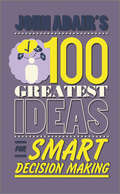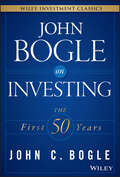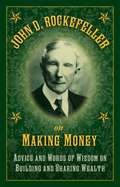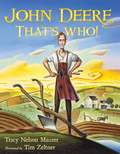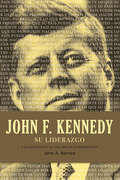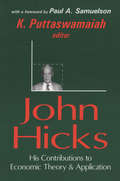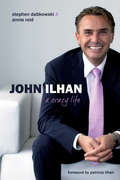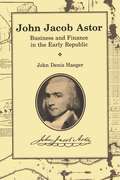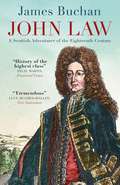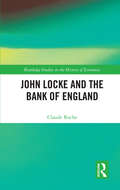- Table View
- List View
John Adair's 100 Greatest Ideas for Smart Decision Making
by John AdairJohn Adair's 100 Greatest Ideas for Smart Decision Making is a one-stop of practical advice and tips on problem solving and productive thinking from one of the world's best-known and most sought after authorities on leadership and management. Inside you will find: 11 Greatest Ideas for Practical Wisdom 8 Greatest Ideas for Problem Solving Strategies 13 Greatest Ideas for How Your Mind Works 8 Greatest Ideas for Clear Thinking 13 Greatest Ideas for Productive Thinking . . . and 47 other fantastic ideas, tips and tricks that will give you the confidence, answers, and inspiration you need to succeed.
John Bogle on Investing: The First 50 Years (Wiley Investment Classics)
by John C. BogleGet fifty years of industry-defining expertise in a single volume John Bogle on Investing is a compilation of the best speeches ever delivered by one of the 20th century's towering financial giants. Individually, each of these speeches delivers a powerful lesson in investing; taken together, Bogle's lifelong themes ring loud and clear. His investing philosophy has remained more or less constant throughout his illustrious career, and this book lays it out so you can learn from the very best. You'll learn what makes a successful investment strategy, consider the productive economics of long-term investing, and how emotional investment in financial markets is often counterproductive enough to forfeit success. Bogle discusses the "fiscal drag" of investing, and shows you how to cut down on sales charges, management fees, turnover costs, and opportunity costs, as he unravels a lifetime's worth of expertise to give you deep insight into the mind of a master at work. John C. Bogle founded Vanguard in 1974, then in the space of a few years, introduced the index mutual fund, pioneered the no-load mutual fund, and redefined bond fund management. This book wraps up the essence of his half-century of knowledge to deepen your understanding and enhance your investment success. Learn why simple strategies are best Discover how emotions can ruin the best investment plan Examine the universality of indexing in the financial markets Minimize the costs — financial and otherwise — associated with investing John Bogle is still in there fighting, still pushing the industry onward and upward. Take this rare opportunity to have industry-shaping expertise at your fingertips with John Bogle on Investing.
John Branca: Negotiating the Beatles' Northern Songs Catalog (A)
by James K. Sebenius Alex GreenIn 1985, pop music superstar Michael Jackson instructed his attorney, John Branca, to make a bid for the Northern Songs music catalog, which contained the songs of the Beatles. In a challenging negotiation with Australian media baron Robert Holmes Court, Branca secured the rights to the collection. Over the next three decades, first as Jackson's attorney and later as the executor of his estate, Branca undertook numerous complex negotiations to secure and expand Jackson's music publishing empire until it became the largest music publishing company in the world.
John Branca: Negotiating the Beatles' Northern Songs Catalog (B)
by James K. Sebenius Alex GreenSupplement
John Chambers, Cisco and China
by Geoffrey G. Jones Emily GrandjeanThis case examines the role of Cisco led by John Chambers in facilitating web filtering in China. It begins with tracing the origins of Cisco as a pioneer of networking equipment. John Chambers, who had worked as a sales manager at IBM and Wang Laboratories, joined Cisco in 1991 and became CEO in 1995. The company expanded rapidly thereafter, acquiring many firms and growing globally, including in China, where it virtually created the internet. The case explores how the firm facilitated surveillance and monitoring of the internet in the Golden Shield project launched in 2000, and in 2004 served as a key participant in the CN2 upgrade which greatly enhanced official capability to filter content online. The case ends in 2007 with Chambers announcing further capital expenditure in China, but facing growing criticism in the US Congress and elsewhere for its human rights record. At the same time Cisco faced a power domestic competitor, Huawei, which had grown rapidly investment in innovation even as Cisco had focused on share buy-backs after experiencing a sharp fall in its share price following the end of the dot.com bubble. The case provides a vehicle for exploring the ethical and human rights responsibilities of corporations in the technology sector, and the impact of the internet on democracy.
John Chambers, Cisco and China: Upgrading a Golden Shield
by Geoffrey G. Jones Emily GrandjeanThis case examines the role of Cisco led by John Chambers in facilitating web filtering in China. It begins with tracing the origins of Cisco as a pioneer of networking equipment. John Chambers, who had worked as a sales manager at IBM and Wang Laboratories, joined Cisco in 1991 and became CEO in 1995. The company expanded rapidly thereafter, acquiring many firms and growing globally, including in China, where it virtually created the internet. The case explores how the firm facilitated surveillance and monitoring of the internet in the Golden Shield project launched in 2000, and in 2004 served as a key participant in the CN2 upgrade which greatly enhanced official capability to filter content online. The case ends in 2007 with Chambers announcing further capital expenditure in China, but facing growing criticism in the US Congress and elsewhere for its human rights record. At the same time Cisco faced a power domestic competitor, Huawei, which had grown rapidly investment in innovation even as Cisco had focused on share buy-backs after experiencing a sharp fall in its share price following the end of the dot.com bubble. The case provides a vehicle for exploring the ethical and human rights responsibilities of corporations in the technology sector, and the impact of the internet on democracy.
John Chambers, Cisco, and China: Upgrading a Golden Shield
by Geoffrey G. Jones Emily GrandjeanThis case examines the role of Cisco led by John Chambers in facilitating web filtering in China. It begins with tracing the origins of Cisco as a pioneer of networking equipment. John Chambers, who had worked as a sales manager at IBM and Wang Laboratories, joined Cisco in 1991 and became CEO in 1995. The company expanded rapidly thereafter, acquiring many firms and growing globally, including in China, where it virtually created the internet. The case explores how the firm facilitated surveillance and monitoring of the internet in the Golden Shield project launched in 2000, and in 2004 served as a key participant in the CN2 upgrade which greatly enhanced official capability to filter content online. The case ends in 2007 with Chambers announcing further capital expenditure in China, but facing growing criticism in the US Congress and elsewhere for its human rights record. At the same time Cisco faced a power domestic competitor, Huawei, which had grown rapidly investment in innovation even as Cisco had focused on share buy-backs after experiencing a sharp fall in its share price following the end of the dot.com bubble. The case provides a vehicle for exploring the ethical and human rights responsibilities of corporations in the technology sector, and the impact of the internet on democracy.
John Crane UK Ltd.: The CAD-CAM Link
by David M. UptonDescribes the improvement of manufacturing performance in a job shop through the application of a variety of techniques such as group technology, manufacturing cells, and CAD-CAM. As well as exploring the limitations and merits of these methods, the case explores the conflict between computer-integration and shop-floor autonomy. The teaching objectives are to provide an understanding of computer techniques available in modern small-batch manufacture, sources of manufacturing improvement, and the implementation of computer-integrated manufacturing.
John D. Rockefeller on Making Money: Advice and Words of Wisdom on Building and Sharing Wealth
by John RockefellerAdvice and words of wisdom from the greatest American businessman and philanthropist. John D. Rockefeller is considered to be the wealthiest man to have ever lived, after adjusting for inflation. An American businessman who made his wealth as a cofounder and leading figure of the Standard Oil Company, he also had a pivotal role in creating our modern system of philanthropy. Collected in John D. Rockefeller on Making Money are the words from the man himself, offering advice on how to successfully start and manage a booming business, as well as the most efficient ways to preserve your wealth once you have acquired it. These quotes also cover: Happiness in the face of great wealth Money and its effects Thoughts on facing public criticism Thoughts on big business in the USA Included are John D. Rockefeller’s thoughts on the most sage and conscientious manner of distributing and sharing your wealth when your wealth is overflowing. Finally, we get a glimpse into Rockefeller’s life with the inclusion of some of his most personal correspondence.
John D. Rockefeller: The Richest Man in the World
by Tom Nicholas Vasiliki FoukaBy the late nineteenth century scale and managerial hierarchies had extended to several major industrial sectors of the U.S. economy. Although the precise mechanisms often varied, this process mainly involved horizontal integration, some form of legal or administrative centralization followed by vertical integration. Standard Oil represents the canonical example of this development. Standard Oil's history is also fully intertwined with the life and career of John D. Rockefeller (1839-1937), one of the most remarkable individuals to define the landscape of American business. Rockefeller's estimated $1.4 billion net worth in 1937 was equivalent to 1.5% of U.S. GDP. According to this metric he was (and still is) the richest individual in American business and economic history.
John Deere Component Works (A)
by Robert S. Kaplan Artemis MarchThe division has recognized the inadequacies of its existing, traditional cost system for estimating product costs. Describes the innovative activity-based system that was developed to more accurately trace overhead costs to individual products. Provides students with the opportunity to critique a standard cost system and to assess the characteristics of the proposed system that traces costs to production activities.
John Deere Component Works (B)
by Robert S. Kaplan Artemis MarchHaving installed an activity-based system, the division is now exploring the insight provided by that system. In particular, it is studying the economics of lot-size process planning and product mix management.
John Deere, That's Who!
by Tracy Nelson Maurer Tim ZeltnerBack in the 1830s, who was a young blacksmith from Vermont, about to make his mark on American history? John Deere, that’s who! <P><P>Who moved to Illinois, where farmers were struggling to plow through the thick, rich soil they called gumbo? Who tinkered and tweaked and tested until he invented a steel plow that sliced into the prairie easy as you please? <P><P>Long before the first tractor, who changed farming forever? John Deere, that’s who!
John F. Kennedy su liderazgo
by John BarnesLos líderes empresariales de hoy tienen mucho encomún con el presidente Kennedy.Ellos enfrentan decisiones enormes en tiempos imprevisibles; sus accionestienen implicaciones que van mucho más allá de sus propias organizaciones; yson juzgados despiadada e incesantemente tanto por sus electores como por losmedios de comunicación. Los profesionales, entonces, harían bien en estudiarlas características de liderazgo que convirtieron a Kennedy en uno de los líderesmundiales más respetados, amados e influyentes de la historia moderna. John F. Kennedy su liderazgo analiza loque convirtió a Kennedy, tanto antes como durante su presidencia, en una fuerzasingular y dominante que serviría como el estándar por el cual los futuroslíderes serían juzgados.
John Hancock Mutual Life Insurance Co.: The Inflation Strategy Task Force (A)
by Louis B. Barnes1980 was a critical time for John Hancock with high inflation, high interest rates, increased competition, and the desertion of policy holders seeking new investment opportunities. A new lower level (of vice presidents) task force was set up by the executive committee (also struggling to build cooperative teamwork) to come up with new strategic visions and directions. The task force has group problems. A rewritten version of an earlier case.
John Hancock Mutual Life Insurance Co.: The Inflation Strategy Task Force (B)
by Louis B. BarnesDescribes what happened after the apparent eruption and traumas within the task force described in the (A) case. The task force moved from being "the very worst committee" according to one member to becoming "the very best." Tries to explain how and why. Also describes some of the longer term outcomes.
John Hicks: His Contributions to Economic Theory and Application
by K. PuttaswamaiahEconomist Sir John Hicks was the first British economist to win the Nobel Prize in Economic Science (1972) for his wide ranging contributions in general and his book Value and Capital in particular. Value and Capital showed that the basic results of consumer theory could be obtained from statistical usage; it expounded what became known as the "Hicksian substitution effect." K. Puttaswamaiah describes Hicks as a brilliant economist without whose effort present-day economies would not have grown in such dimension by now and Value and Capital as a work that revolutionized the science of economics. John Hicks is a unique collection of essays that examine Hicks through personal recollections as well as critiques and analyses of his work. For this very special volume, K. Puttaswamaiah has gathered 25 contributors. Some were friends, colleagues, and students of Hicks. All are eminent in their own areas of Hicks' work. Their articles depict various aspects of the economist's thought and personality, some depicting him in a new light. "My John Hicks," by Paul A. Samuelson identifies the landmarks in Hicks' life. Colin Simkin's "John and Ursula Hicks-A Personal Recollection" gives a vivid account of the economist's inner life. O.F. Hamouda's essay, "Hicks, A World Economist" presents a scholarly and comprehensive analysis of Hicks' economics. In "Hicks and Economic Theory," Frank Kahn sets out his own views on the major works of Hicks. Harald Hagerman distinguishes between the works of Hicks and Hayek in "Monetary Causes of the Business Cycles and Technological Changes: Hicks vs. Hayek." Axel Lejonhufvud presents a memoriam on the life and works of Hicks. The other authors have chosen different areas of Hicks' works-sometimes focusing on a single work and giving a vivid account of their own thoughts on the area chosen. This volume will interest economists and students who are concerned with Hicks' works in relation to earlier thinkers and present-day economic theory. K. Puttaswamaiah is the senior director, Planning Department, Government of Karnataka State, India. He has written or edited fourteen books. He is the founding editor of the Indian (now International) Journal of Applied Economics & Econometrics.
John Ilhan: A Crazy Life
by Stephen Dabkowski Annie ReidJohn Ilhan: A Crazy Life tells the fascinating story of John Ilhan -- a working-class immigrant who overcame incredible odds to become one of the richest men in Australia. Founder of phenomenally successful mobile telephone company Crazy John's, Ilhan tragically passed away in 2007 at the age of forty-two. As told through the eyes of his family, friends and colleagues, this poignant biography reveals new insights into the man behind Crazy John's, the wife and four children he left behind and his David and Goliath battle with Telstra. Ilhan's inspirational journey shows how self-belief, passion and a never-say-die attitude can see you achieve your dreams. "When you share your life with a true achiever it's hard to fully comprehend the impact they can have on the broader community. Unfortunately for my family, I learned about that impact the day John passed away. " -Patricia Ilhan, co-founder, Ilhan Food Allergy Foundation "When John passed away we lost a truly wonderful person who was a giant at everything he did and a truly free spirit. The amazing thing was he'd only just started to make his mark on the wider community. " -Brendan Fleiter, Chief Executive Officer, Crazy John's ". . . he was a migrant from Turkey who grew up in Broadmeadows and rose to a very senior position in our community. To my mind John lived until he was 100; he just did it in forty-two years. " -Eddie McGuire, President, Collingwood Football Club
John Jacob Astor, 1763-1848
by Thomas K. MccrawAstor, the wealthiest American of his time, engages in fur trading, shipping, real estate investment, and general merchandise trading. Astor's career illustrates the immediate pre-modern management era: types of decisions, time horizons, and number of transactions.
John Jacob Astor: Business and Finance in the Early Republic (Great Lakes Books Series)
by John Denis HaegerJohn Jacob Astor was the best-known and most important American businessman for more than a half-century. His career encompassed the country's formative economic years from the precarious days following the American Revolution to the emergence of an urban-centered manufacturing economy in the late 1840s. Change was the dominant motif of the period, and Astor either exemplified the varied economic, social, and political changes in his business career or he directly affected the course of events. In this biography of John Jacob Astor, John Denis Haeger uses Astor's life and his career as a merchant, fur trader, and land speculator as vehicles for examining several important themes and issues in American economic and urban development between 1790 and 1860. Haeger addresses, in fascinating detail, the complexity of Astor's business endeavors, his extensive connections with the country's dominant political figures, and the "modern" business strategies and managerial techniques that he used to build his business empire. Astor was clearly not a business revolutionary who radically altered an existing system. He was, however, an entrepreneur who exerted a profound change on an industry. He fascinated his contemporaries precisely because he so mirrored his age and its changing business and economic patterns. He grasped the greater size and complexity of an emerging commercial economy in post-Revolutionary America and adopted strategies and structures that transformed the fur and China trades. His investment in city real estate, stocks, bonds, and even a western city made him part of America's evolution into an urbanindustrial society. For his era, John Astor's career was remarkable for its modernity, vision, and reflection of American economic and political values. More than just a personal biography, John Jacob Astor combines economic theories with a fascinating narrative that demonstrates, like no other book has, Astor's impact on the early republic.
John Law: A Scottish Adventurer of the Eighteenth Century
by James BuchanAt the summit of his power, John Law was the most famous man in Europe. Born in Scotland in 1671, he was convicted of murder in London and, after his escape from prison, fled Scotland for the mainland when Union with England brought with it a warrant for his arrest. On the continent he lurched from one money-making scheme to the next - selling insurance against losing lottery tickets in Holland, advising the Duke of Savoy - amassing a fortune of some £80,000.But for his next trick he had grander ambitions. When Louis XIV died, leaving a thoroughly bankrupt France to his five-year-old heir, Law gained the ear of the Regent, Philippe D'Orleans. In the years that followed, Law's financial wizardry transformed the fortunes of France, enriching speculators and investors across the continent, and he was made Controller-General of Finances, effectively becoming the French Prime Minister. But the fall from grace that was to follow was every bit as spectacular as his meteoric rise.John Law, by a biographer of Adam Smith and the author of Frozen Desire and Capital of the Mind, dramatises the life of one of the most inventive financiers in history, a man who was born before his time and in whose day the word millionaire came to be coined.
John Law: A Scottish Adventurer of the Eighteenth Century
by James BuchanAt the summit of his power, John Law was the most famous man in Europe. Born in Scotland in 1671, he was convicted of murder in London and, after his escape from prison, fled Scotland for the mainland when Union with England brought with it a warrant for his arrest. On the continent he lurched from one money-making scheme to the next - selling insurance against losing lottery tickets in Holland, advising the Duke of Savoy - amassing a fortune of some £80,000.But for his next trick he had grander ambitions. When Louis XIV died, leaving a thoroughly bankrupt France to his five-year-old heir, Law gained the ear of the Regent, Philippe D'Orleans. In the years that followed, Law's financial wizardry transformed the fortunes of France, enriching speculators and investors across the continent, and he was made Controller-General of Finances, effectively becoming the French Prime Minister. But the fall from grace that was to follow was every bit as spectacular as his meteoric rise.John Law, by a biographer of Adam Smith and the author of Frozen Desire and Capital of the Mind, dramatises the life of one of the most inventive financiers in history, a man who was born before his time and in whose day the word millionaire came to be coined.
John Locke and the Bank of England (Routledge Studies in the History of Economics)
by Claude RocheJohn Locke was one of the first shareholders of the Bank of England and participated in parliamentary debates surrounding its creation. He had a key role in the monetary reform of 1696. This book examines Locke’s thought in relation to credit, banking regulation, the monetary and financial system, the gold standard and the principles of Natural Right. It also establishes a link between Locke’s economic and financial ideas and his political philosophy. John Locke and the Bank of England will be of interest to advanced students and researchers of central banking, financial history, the history of economic thought and political economy.
